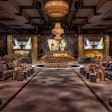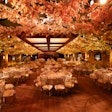So what's next? It's a question many people ponder at the beginning of every year, and it's an especially apt topic for both the times (four months after terrorists temporarily halted this city) and the special event industry (a business still feeling that act's economic effects). So we asked a diverse group of industry professionals--buyers and sellers, caterers and designers, corporate planners and small company leaders--to give us their take on the state of special events. What are the challenges facing the industry this year? What will successful events look like? What types of food, decor and entertainment will feel appropriate? Their responses, excerpted here, provide a snapshot of what a disparate industry is thinking.
Tell us what you're thinking: Send an email to BiZBash Editor in Chief Chad Kaydo at [email protected].
During hard times, people are drawn to the larger-than-life. Look at the entertainment industry during the Depression or World War II. Escapism was the fad in Hollywood. I think events will still retain a larger-than-life look and feel.
There will be a greater emphasis on exotic cuisines and destinations. The out-of-country events are being cancelled, so we have to create that feel and energy here at home. Food is already becoming more casual, and people will opt for an incredible cocktail party with highly flavored hors d'oeuvres (Southeast Asian, Brazilian, etc.) over the standard sit-down dinner. We'll probably see more patriotism in terms of comfort foods on menus, but these comfort foods will reflect the melting pot that makes our country so diverse.
Gary Pagano
Director of Special Events, MTV Networks
Event we've covered: Behind the Music: VH1/Vogue Awards
I think events will have a warm feeling of home. Maybe they'll be smaller. We'll see less black tie; more simple, comfort food; less showy decor and entertainment that have a "too expensive" look. (That said, I went to a big bash on New Year's Eve and it felt wonderful!)
Successful events will be the ones that people actually enjoy going to; where they feel good about supporting worthwhile charities and attending their important corporate events. We will all think more carefully about spending and giving money. People will make choices about what they do; spending time with family and friends will become a priority to many. That will be this year's challenge--I think events will need to have meaning and relevance. But this is New York, and people love to have a good time.
Felice Axelrod
Vice President and Director of the Department of Protocol, Lehman Brothers
President, Council of Protocol Executives
The biggest challenge is booking group business. That's what is needed more than ever now because of the economy.
To book this kind of business, you have to do direct sales. One-on-one relationships need to come into play.
Greg Gibadlo
Vice President of Convention Development, NYC & Company
Special events are often associated with indulgence, parties and celebration. In 2002, event professionals face the challenge of a struggling economy--how can we celebrate when times are tough? However, my gut tells me that good times are ahead. With new vitality in the marketplace, companies will reinstate event marketing campaigns, publicists will use events to create headlines and the entertaining social circuits will be in full gear. With a renewed spirit, we'll be ready to celebrate--we'll need to celebrate.
In 2002, event professionals must be more creative and resourceful than ever before. We must push the boundaries of limited budgets. We must create environments and experiences that lead us into a new year, but are cognizant of the past. Events will be celebratory, but not excessive. Parties will renew, but not overcome. This year will create the benchmark where events are reflective of the times.
Tony Larrisey
Events Manager, Barnes & Noble.com
The biggest initial challenge will be to show that the special event industry still has relevance in the post-September 11 culture. Premieres, store openings, awards ceremonies--immediately after the attacks they all seemed meaningless, but now they have an underlying significance to the city's economy and overall mood. The event industry can help communicate the fact that there are plenty of great reasons to celebrate, and no better place to do it than in New York.
Brenda Loughery
Partner/COO, Lizzie Grubman Public Relations
Event we've covered: Packing in Hipsters at the Gotham Launch
Because of the economic situation, I think it is more important than ever for the event industry to quantify the results of our events. We need to act strategically, not reactively (we are, after all, event planners, not event reactors). We need to ask why we are running events, not just how. I believe every event, big or small, should begin with careful consideration of the goals and objectives of each activity, then--once the event is over--those goals need to be carefully analyzed. That follow-through is vital to solidifying the existence of our industry.
We all know that in tight times, special events are the first to go--many of us are tightening our belts, or looking for jobs. But people need to be with people. We all still like going to parties. So it's time to think smart, act smart and produce the best events we can.
Pamela Miller
Director of Special Events, Breast Cancer Research Foundation
Event we've covered: Mamma Mia! Previews for Benefit
One of biggest challenges for 2002 will be to lure back the incentive market. New York is no longer the hot destination for these groups. We need to work with DMCs to create affordable, attractive packages to lure these big groups back to New York.
I think clients will be looking for new styles--less luxurious; more clean, elegant and tasteful styles, with emphasis on excellent, well-prepared, stylishly presented foods. Wine selections will be more conservative in price, but interesting. This year is a new beginning and we will see a new definition of New York style in events.
Mary Dearborn
Vice President of Catering, Restaurant Associates
Event we've covered: Exotic Fare for MTV's VMAs
Parties have fallen into a formulaic concept that if there is a model, actress, rapper and 'hot' DJ the party is deemed a success. I think not. There will be a return to events that engage many diverse lifestyles.
The human touch of event styling will return. Special events have become stale and staid because too many special events coordinators use the same florists, venues, DJs, guest lists, etc. This dearth of personality will be abandoned in favor of intimate flair that celebrates the special event specialist, the events' goals and the attendees. And I can't wait.
Victoria Clark
Program Coordinator, New York Women in Film & Television
Event we've covered: Film Fashionistas Chat at Sotheby's
Even before the recent economic downturn and September 11, we were seeing some major refocusing in terms of the how and the why of events. Events for the sake of events and excess for the sake of excess had already become outdated. I think we were seeing an increasing awareness of how successful events can be strategic marketing tools.
Strong companies know that in order to stay vital in these especially challenging times, they are going to have to invest in marketing efforts outside of the norm, and that they are going to need to commit substantial resources to these efforts. This is going to require some new kinds of ingenuity, because the old formulas won't work here. And I see a lot of opportunity for us, as event professionals, to challenge ourselves to produce products that are more meaningful and impactful.
Laura Aviva
Senior Events Manager, Travel & Leisure
Event we've covered: T&L Returns to Blowout Style
The biggest challenge is budget cuts--plain and simple. The first thing to be slashed in a recession are the marketing and promotional budgets of a company, and special events typically fall under these departments' responsibilities. Without the money to execute these events our industry is facing big challenges.
Well-executed, specifically targeted events that appeal to the consumer will win out over big, splashy, generic events of the dot-com era. People are looking for the best bang for their buck. We are moving into an era of "more is less" and success will stem from these three rules of thumb: Appeal to your consumer. Always come in under budget. The client is always right.
The patriotic theme of red, white, and blue will not continue through 2002. I think we are going to see warm colors, inviting themes and fresh ideas. People want to feel welcome and cared for.
Sasha Tcherevkoff
Head of Special Projects, Paul Wilmot Communications
Event we've covered: Puffy's Kiddie-Filled Skating Party
Posted 01.09.02
MORE: Read Part Two of this special report, with more thoughts on the challenges and new styles for 2002...
Tell us what you're thinking: Send an email to BiZBash Editor in Chief Chad Kaydo at [email protected].
During hard times, people are drawn to the larger-than-life. Look at the entertainment industry during the Depression or World War II. Escapism was the fad in Hollywood. I think events will still retain a larger-than-life look and feel.
There will be a greater emphasis on exotic cuisines and destinations. The out-of-country events are being cancelled, so we have to create that feel and energy here at home. Food is already becoming more casual, and people will opt for an incredible cocktail party with highly flavored hors d'oeuvres (Southeast Asian, Brazilian, etc.) over the standard sit-down dinner. We'll probably see more patriotism in terms of comfort foods on menus, but these comfort foods will reflect the melting pot that makes our country so diverse.
Gary Pagano
Director of Special Events, MTV Networks
Event we've covered: Behind the Music: VH1/Vogue Awards
I think events will have a warm feeling of home. Maybe they'll be smaller. We'll see less black tie; more simple, comfort food; less showy decor and entertainment that have a "too expensive" look. (That said, I went to a big bash on New Year's Eve and it felt wonderful!)
Successful events will be the ones that people actually enjoy going to; where they feel good about supporting worthwhile charities and attending their important corporate events. We will all think more carefully about spending and giving money. People will make choices about what they do; spending time with family and friends will become a priority to many. That will be this year's challenge--I think events will need to have meaning and relevance. But this is New York, and people love to have a good time.
Felice Axelrod
Vice President and Director of the Department of Protocol, Lehman Brothers
President, Council of Protocol Executives
The biggest challenge is booking group business. That's what is needed more than ever now because of the economy.
To book this kind of business, you have to do direct sales. One-on-one relationships need to come into play.
Greg Gibadlo
Vice President of Convention Development, NYC & Company
Special events are often associated with indulgence, parties and celebration. In 2002, event professionals face the challenge of a struggling economy--how can we celebrate when times are tough? However, my gut tells me that good times are ahead. With new vitality in the marketplace, companies will reinstate event marketing campaigns, publicists will use events to create headlines and the entertaining social circuits will be in full gear. With a renewed spirit, we'll be ready to celebrate--we'll need to celebrate.
In 2002, event professionals must be more creative and resourceful than ever before. We must push the boundaries of limited budgets. We must create environments and experiences that lead us into a new year, but are cognizant of the past. Events will be celebratory, but not excessive. Parties will renew, but not overcome. This year will create the benchmark where events are reflective of the times.
Tony Larrisey
Events Manager, Barnes & Noble.com
The biggest initial challenge will be to show that the special event industry still has relevance in the post-September 11 culture. Premieres, store openings, awards ceremonies--immediately after the attacks they all seemed meaningless, but now they have an underlying significance to the city's economy and overall mood. The event industry can help communicate the fact that there are plenty of great reasons to celebrate, and no better place to do it than in New York.
Brenda Loughery
Partner/COO, Lizzie Grubman Public Relations
Event we've covered: Packing in Hipsters at the Gotham Launch
Because of the economic situation, I think it is more important than ever for the event industry to quantify the results of our events. We need to act strategically, not reactively (we are, after all, event planners, not event reactors). We need to ask why we are running events, not just how. I believe every event, big or small, should begin with careful consideration of the goals and objectives of each activity, then--once the event is over--those goals need to be carefully analyzed. That follow-through is vital to solidifying the existence of our industry.
We all know that in tight times, special events are the first to go--many of us are tightening our belts, or looking for jobs. But people need to be with people. We all still like going to parties. So it's time to think smart, act smart and produce the best events we can.
Pamela Miller
Director of Special Events, Breast Cancer Research Foundation
Event we've covered: Mamma Mia! Previews for Benefit
One of biggest challenges for 2002 will be to lure back the incentive market. New York is no longer the hot destination for these groups. We need to work with DMCs to create affordable, attractive packages to lure these big groups back to New York.
I think clients will be looking for new styles--less luxurious; more clean, elegant and tasteful styles, with emphasis on excellent, well-prepared, stylishly presented foods. Wine selections will be more conservative in price, but interesting. This year is a new beginning and we will see a new definition of New York style in events.
Mary Dearborn
Vice President of Catering, Restaurant Associates
Event we've covered: Exotic Fare for MTV's VMAs
Parties have fallen into a formulaic concept that if there is a model, actress, rapper and 'hot' DJ the party is deemed a success. I think not. There will be a return to events that engage many diverse lifestyles.
The human touch of event styling will return. Special events have become stale and staid because too many special events coordinators use the same florists, venues, DJs, guest lists, etc. This dearth of personality will be abandoned in favor of intimate flair that celebrates the special event specialist, the events' goals and the attendees. And I can't wait.
Victoria Clark
Program Coordinator, New York Women in Film & Television
Event we've covered: Film Fashionistas Chat at Sotheby's
Even before the recent economic downturn and September 11, we were seeing some major refocusing in terms of the how and the why of events. Events for the sake of events and excess for the sake of excess had already become outdated. I think we were seeing an increasing awareness of how successful events can be strategic marketing tools.
Strong companies know that in order to stay vital in these especially challenging times, they are going to have to invest in marketing efforts outside of the norm, and that they are going to need to commit substantial resources to these efforts. This is going to require some new kinds of ingenuity, because the old formulas won't work here. And I see a lot of opportunity for us, as event professionals, to challenge ourselves to produce products that are more meaningful and impactful.
Laura Aviva
Senior Events Manager, Travel & Leisure
Event we've covered: T&L Returns to Blowout Style
The biggest challenge is budget cuts--plain and simple. The first thing to be slashed in a recession are the marketing and promotional budgets of a company, and special events typically fall under these departments' responsibilities. Without the money to execute these events our industry is facing big challenges.
Well-executed, specifically targeted events that appeal to the consumer will win out over big, splashy, generic events of the dot-com era. People are looking for the best bang for their buck. We are moving into an era of "more is less" and success will stem from these three rules of thumb: Appeal to your consumer. Always come in under budget. The client is always right.
The patriotic theme of red, white, and blue will not continue through 2002. I think we are going to see warm colors, inviting themes and fresh ideas. People want to feel welcome and cared for.
Sasha Tcherevkoff
Head of Special Projects, Paul Wilmot Communications
Event we've covered: Puffy's Kiddie-Filled Skating Party
Posted 01.09.02
MORE: Read Part Two of this special report, with more thoughts on the challenges and new styles for 2002...




















